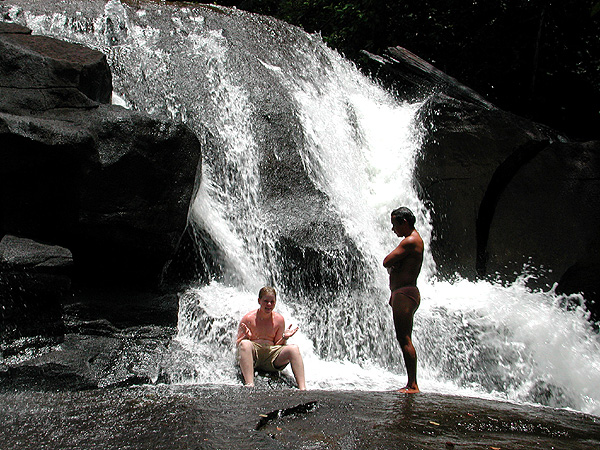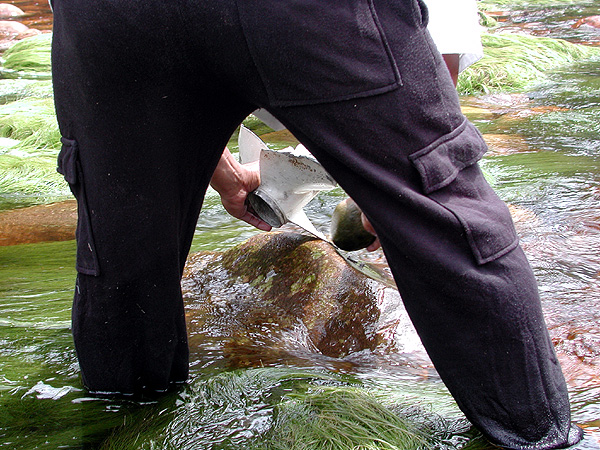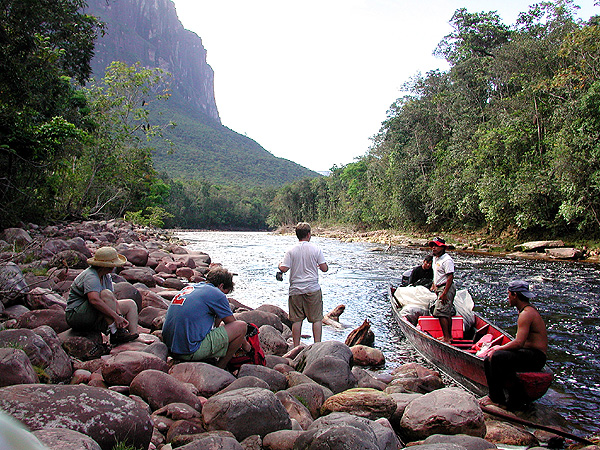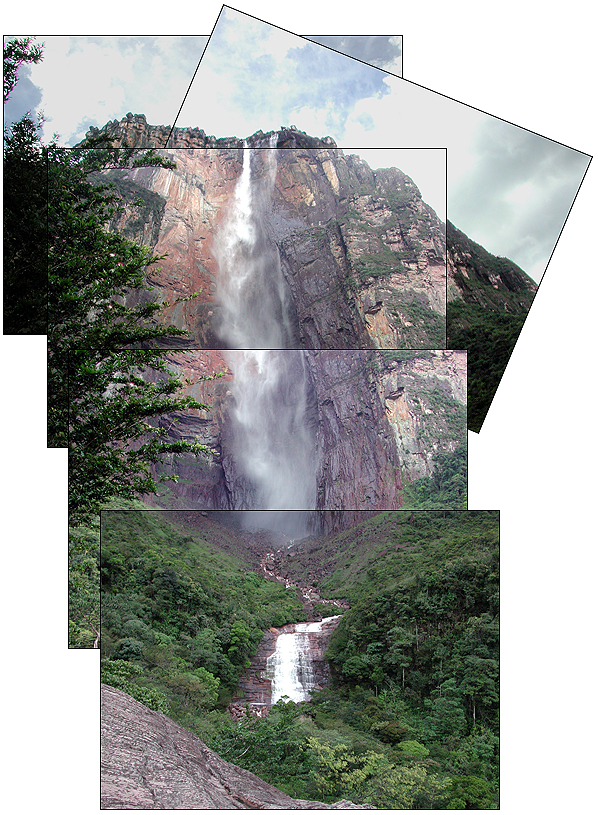After writing my last dispatch, I made my way across the hut to where the hammocks were splayed out from a central pole. I had selected my hammock earlier, and it was waiting for me. At 11pm at night, it was still fairly hot and humid in the camp. I stripped down to my boxers, grabbed my toothbrush, and went to the bathroom to wash for bed.
My mouth was full of toothpaste when the lights went out. All of the lights. The generator that powered the camp had gone off. I rinsed out my mouth in the dark and made my way back to my hammock. Luckily there was a nearly-full moon and my eyes adjusted enough to see.
The hammocks are not the garden hammocks we often see in North America. They don’t have spreader bars to keep them nice and flat. To get into them, you first lift up one side of the gauzy mosquito netting which covers them and drapes to the ground. Once you’re under the netting, you spread the hammock out a little and sit in it from the side. Despite what you may see on sitcoms, the hammock doesn’t seem to have a tendency to spin around dumping you on the ground. It’s pretty stable.
Next, you swing your legs up into the hammock so that you’re laying lengthwise. Don’t go to sleep this way… you’ll wake up with a sore back from being curved all night. Rather, start poking your feet out perpendicular to the hammock in one direction and your head in the other, until you’re laying diagonally. This will put your body in a nearly horizontal, rather than bowed, position. The hammock is also very stable in this position, and doesn’t tend to rock much from side to side.
Sleeping diagonally in the hammock, I found that I didn’t need a pillow. If I wanted my head raised a little, I’d move my head closer to the end of the hammock. If I wanted my head lower, I’d move my feet closer to the other end. It took me about 2 minutes of shifting to find a really comfortable sleeping position. I covered myself with a blanket and slept.
The next morning, we woke reluctantly. Breakfast consisted of scrambled eggs and arepas. Arepas are ubiquitous in Venezuela, and consist of patties of fried corn flour. They’re sort of like a deep-fried polenta patty, crunchy on the outside and firm inside. Sliced open and filled with a slice of cheese and some eggs, they’re incredibly yummy.
We had each packed a small overnight bag. We took these onto one of the dugouts and motored over to the mainland. We climbed up past the Canaima Hydroelectric Plant to the top of the falls. The hydroelectric plant is fairly small and powers the entire city of Canaima proper. Covered with planters of flowers, it looks more like a waterside hacienda than a power plant.
Just past the top of the falls is Puerto Canaima. It’s not much of a port. It’s more like a few dozen dugouts tethered to the bank. A few families hung out on the bank and looked us over curiously. Our gear was loaded onto a Bernal dugout, wrapped in plastic, and we climbed aboard.
The ship’s crew consisted of three people. There was Vladmir, our guide and two boatsmen. They were all Pemon (the tribe living in the area of Canaima.) One ran the Yamaha outboard motor, standing in the rear of the boat. The other sat on the bow, his feet hanging over the water to either side. He watched for rocks and sent hand signals back to the driver.
We headed upriver at a pretty fast pace. A spray of water arched 4 feet into the air from either side of the front of the boat, and the wind covered us in spray. We’d been warned that we would get wet, so we were all in swimsuits and sandals. The water actually felt good. It was early morning, but the day was already hot.
About half hour upriver, the boat pulled to shore. A trail led up over a grassy hill. “There are bad rapids upriver. We will walk around them” said Vladmir. We got out, and the two boatmen went up the rapids without us.
It was a half hour before we descended to the river again. The boat was waiting for us, looking no worse for wear. (We, however, were hot and very sweaty.) We all got in, and motored upriver again. The wind and spray felt great.
At around noon, we pulled ashore at a small cascade. “This is Salto Felicidad” said Vladmir, “Happiness Falls.” We got out for a swim in the pool at the base of the falls. Vladmir swam in his briefs. Tyler was jumping from the cliffs into shallow water. “Tyler, watch out!” shouted Vladmir nervously, but the water drowned out his voice. We all took turns sitting under the falls. Afterwards we dried off on the hot rocks while eating sandwiches. Overhead, flowering vines dropped down from the trees. It was pretty idyllic.
After another hour, the boat slowed and stopped. Vladmir stood up. He spoke for a while with the drivers in Pemon. “The river is very low right now. We will have difficulty, and it may be necessary to pull the boat. There are many rocks. Keep your hands in the boat at all times.” Ahead of us was white water. Vladmir sat down, the motor roared, and off we went.
We climbed one set of rapids after another. Some were fairly simple. We would come in fast, and at the last minute the engine would be lifted out of the water and the boat would glide through the shallows on its own momentum. Then the engine would be dropped again and we’d continue on our way.
In rougher rapids the water would come over the side of the boat, usually putting several gallons into someone’s lap. There would be gasps, and curses, and laughter.
Then there were the really tough parts. There was one area where we needed to pass through a twisty passage of huge boulders. As we were all pushing the boat away from a rock, Shay yelled out “Hey, look at that huge spider!” Everyone’s hands were yanked away from the rock, but we were past the tight spot. At another point, there was a long shallow rapids. While trying to motor our way through it, the propeller hit a rock hard. Part of the prop was sheered off and went flying across the river. We stopped just past the rapids where the driver pounded what remained of the prop back into shape with a rock.
Sometimes we needed to come in close to the bank to find deep water. We’d zoom up through rapids, the boat bouncing, while vines and branches whooshed by overhead. During one of these thrill rides, we passed a dugout overturned up in the trees. I thought it was a remote settlement, and asked Vladmir about it. “Un accidente” he said gravely.
As we went further and further upriver, the forest grew more and more dense. The jungle crept out into the water. On every tree were numerous other plants, some with long thin roots dropping 30 or 40 feet into the water. Many trees held termite nests. A large bird dove into the river and flapped up again. It was a kingfisher. A little later we passed one on a rock. It was over a foot tall, and stretched out its neck to watch us continue upriver.
Above the jungle were the tepuys. The term refers to a flat-topped mountain, and comes from the Pemon term ‘Te Pu’ meaning simply ‘mountain.’ We followed Auy·n Tepuy for the last two hours of the boat trip. It’s massive, and the top is covered with weird rock formations. One area resembled pillars set in a circle, and another resembled a medieval fortress. It’s not surprising that Auy·n Tepuy means ‘Devil Mountain’ in Pemon… the top looks like it would be home to demons. (Yes, Angel Falls drop from Devil Mountain, but the names aren’t related. The falls were named after Jimmy Angel, who crash-landed on the tepuy in 1937 while hu
nting for gold.)
At around 4pm, Salto Angel came into view, shooting out from the edge of the mountain into space. We pulled up to the side of the river and started inland towards the falls. The boatmen stayed with the dugout. After passing a shelter on the river’s edge, we entered the jungle.
The walk to the falls is through thick rain forest. A trail has been cut, but the floor of the jungle is still a tricky mess of roots, rocks, and mud. Around us plants grew on other plants. Flowers fell to the jungle floor from the canopy high above. Some vines dropping from high above were home to 5 foot tall bromeliads. The jungle floor was thick with ferns and other plants. Everything was wet, slick, and green.
We walked through the forest for an hour, climbing sometimes at a 45° angle. We climbed across streams on logs and jumped from rock to rock across muddy sections. (Shay, happy with his new double-waterproof boots, marched straight through the mud.)
Then we came out of the forest onto a rock overlooking the falls. 1 kilometer above us, the water came off of Auy·n Tepuy. It fell for 989 meters, spreading into mist as it fell. We took pictures, drank water, and relaxed for a moment.
But it was 5pm. In Venezuela, nearly on the equator, the sun sets within a few minutes of 6pm all year long, and the walk back would take an hour. We started out. I went first, as I was fastest. I tried to see how fast I could go without getting muddy or slipping. This turned out to be quite fast. My Teva sandals gripped the roots underfoot like crampons, and I bounced from rock to root to trunk with no slips. I ran down the trail. After 20 minutes, a downpour started. I stripped off my shirt, wrapped my camera in it, and continued running. After about twenty minutes, the rain stopped again.
I reached the shelter by the river’s edge just before 6pm. The sun was setting, and it was getting dark fast. The boat was gone. I sat on a bench under the shelter, spread out my clothing to dry and waited. Just after dark it started to rain, hard. In the distance thunder cracked.
Then through the deluge I saw a person enter the clearing running. “Hola!” I yelled. He veered towards me and I saw it was Vladmir, alone. “Donde son los otros?” I asked. “Perdido” he replied. Lost. “Yo estaba el primero” I told him. I was the first. He nodded, dropped his gear under the shelter, and ran back into the forest. The rain continued.
About ten minutes later the rains had slowed to a trickle. Jeanne and Tyler came walking into camp. “Where is Shay?” I asked them. “Well, that’s a good question, isn’t it? Where is Shay?” said Jeanne. Apparently Shay had gone off on his own, and Vladmir was hunting for him. I wondered how you could find a small boy in such a thick jungle. I wondered if Vladmir would sniff a broken branch and know where Shay had gone off track. I doubted it.
Luckily the suspense didn’t last long. About five minutes later Shay and Vladmir came trudging into camp. “Vamos!” said Vladmir. Let’s go.
We went down to the water’s edge just as it started raining harder than ever. It rained so hard that it was hard to see a person standing just five feet away. Within seconds we were drenched again. Vladmir started whooping, and we all took turns yelling at the top of our lungs. Finally, after an endless (and very wet) wait we faintly heard the sound of an engine above the sound of the rain. The dim shape of the dugout approached up the river.
We carefully climbed in and took a short ride across the river to Bernal’s camp in Isla Ratón (‘Mouse Island.’) There was a shelter there, a simply wooden frame with a tin roof, a few hammocks, and an enclosed kitchen. Our gear was waiting for us in the shelter, thankfully dry.
By the light of scattered candles we stripped off our wet clothing and changed into dry. The sand floor of the camp was dry and warm, and I decided to go barefoot. My sandals were soaked, and I wanted to avoid anything wet.
We all gathered around the table, since it was the only place to sit in camp. “Why do we keep having these adventures?” I asked, and we laughed. We were all exhausted. It had been quite a day.
Then dinner was served. A big plate of spaghetti with a sauce of tomato and canned tuna, a small salad, and spit-roasted bird of some sort. Tyler thinks it was Cornish Game Hen, but I think the wings were too large. Whatever it was, it was delicious. Better than any poultry I’ve ever eaten. I finished off my portion and a second. In the kitchen, the three guides talked and laughed in Pemon while eating their dinner.
The next morning we were awakened by Vladmir yelling “Buenos dias, Salto Angel!” Normally the falls are in clouds in the morning, but today the sky was clear and the falls were spectactular. We stood around and took pictures, stretched, and drank coffee.
After a short breakfast we packed up our gear and headed down river. The trip down was easier and much quicker. We got wet going through the rapids, but the day was hot and no one minded. I was sitting just behind the front boatman. If I leaned forward I could smell him. He smelled wonderful, clean and a little musky.
Tonight we’re in Caracas at Hotel Savoy once again. Tomorrow we wanted to go to Mérida, but we won’t make it. There is a problem with a missing piece of paperwork necessary to bring our cars into the country. Apparently we should have gotten a vehicle import permit while in Miami, and we didn’t. We’ll stay in Caracas to solve the problem.
After my adventure in the jungle, I’ve accumulated a number of itchy bites, mostly around my feet and ankles. We bought tubes of the local post-bite cure called Andantol. According to the label it’s “0.75% clorhidrato de N-dimetilamino isopropil-tiofenilpiridilamina”, and it’s supposed to stop the itching. It seems to help, but only a little.
Ron



